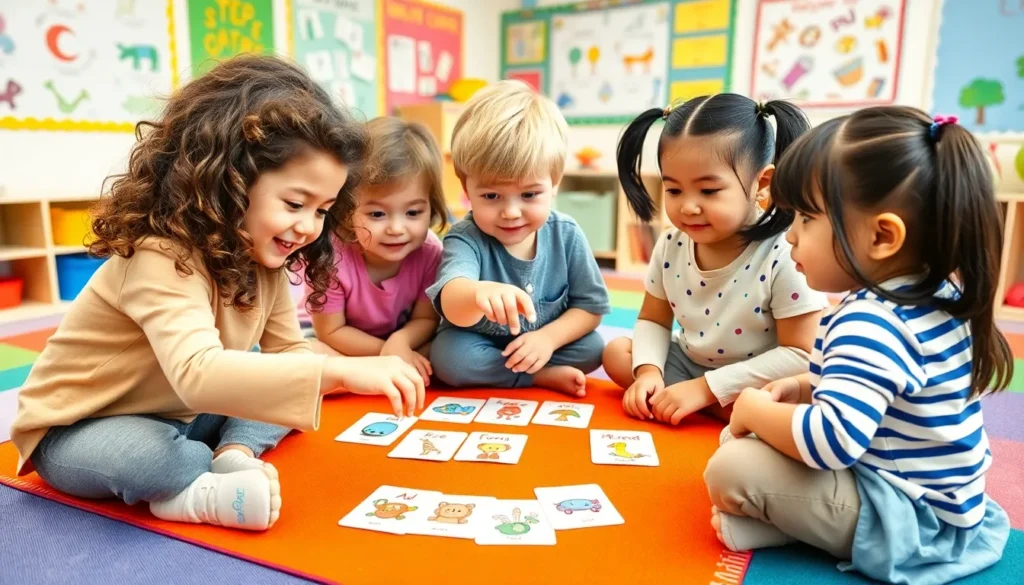Table of Contents
ToggleIn a world where toddlers seem to have an endless supply of energy, turning playtime into learning time can feel like a superhero feat. But fear not! Learning games for preschoolers are here to save the day. These engaging activities not only keep little ones entertained but also sneak in essential skills like counting, problem-solving, and social interaction. It’s like giving your child a fun-sized education wrapped in a candy-coated shell!
Overview of Learning Games for Preschoolers
Learning games for preschoolers play a crucial role in early childhood development. These games foster cognitive skills, enhance motor skills, and boost social abilities. Engaging in these activities stimulates curiosity and encourages a love for learning.
Popular games such as matching cards improve memory and recognition skills. Number-related activities like counting games introduce basic math concepts in a fun way. Hands-on games using building blocks develop fine motor skills and spatial awareness.
Preschoolers benefit from role-playing games, where they explore social situations and practice communication skills. Interactive options such as puzzles encourage problem-solving and critical thinking.
Various learning games also promote teamwork. Children often work together, sharing ideas and solving challenges collaboratively. Many games incorporate educational themes, making it easy for parents and educators to reinforce lessons learned in the classroom.
By integrating fun with educational content, these games cater to different learning styles. Visual learners may excel in color-matching games, while auditory learners benefit from songs and rhymes. Opportunities for creative expression arise through art-based games, helping to develop imagination.
Research indicates that play-based learning leads to better retention of information. A variety of learning games encourages exploration and experimentation, paving the way for future academic success.
Benefits of Learning Games

Learning games provide multiple advantages for preschoolers. They promote growth in various developmental areas, making them an essential tool in early childhood education.
Cognitive Development
Learning games significantly enhance cognitive development in preschoolers. These activities challenge children to think critically and solve problems. For example, puzzles require kids to recognize patterns and make decisions. Number games introduce basic math skills through interactive fun. Memory games strengthen retention by encouraging recall and recognition. Skill-based tasks foster logical thinking and boost attention spans. Engaging in these types of games not only makes learning enjoyable but also lays a strong foundation for future academic success.
Social Skills Enhancement
Social skills develop best when children engage in cooperative learning games. These activities encourage communication and foster teamwork. Role-playing games simulate real-life situations, allowing preschoolers to practice sharing and taking turns. Group activities build camaraderie among peers, teaching them the importance of empathy and cooperation. Moreover, these games offer opportunities for conflict resolution, helping children learn to navigate disagreements. Frequent interaction through play strengthens friendships and promotes emotional intelligence, which is crucial for long-term social development.
Types of Learning Games
Learning games for preschoolers come in various forms, each catering to different aspects of development while providing entertaining experiences. Here are some popular types of learning games.
Educational Board Games
Educational board games engage preschoolers in critical thinking while making learning enjoyable. Games like “Chutes and Ladders” teach counting and basic strategy. Another example, “Candy Land,” enhances color recognition and turn-taking skills. Board games promote family interaction, fostering social skills between children and adults. They also encourage communication as kids explain their moves and decisions. Various options exist to match educational needs and learning objectives.
Interactive Digital Games
Interactive digital games attract preschoolers with colorful graphics and engaging gameplay. Applications such as “Endless Alphabet” help young learners expand vocabulary through fun animations. Games like “ABCmouse” introduce essential concepts, including numbers, letters, and early math skills. Children develop fine motor skills as they tap, swipe, and drag on screens. Balance between screen time and other activities remains important for a well-rounded learning experience. Many games can adapt to different learning paces and preferences.
Outdoor Learning Activities
Outdoor learning activities bolster physical health while promoting cognitive development. Activities like scavenger hunts challenge observation skills and encourage exploration. Nature walks offer opportunities to learn about colors, shapes, and animal sounds. Children develop motor skills through games like “Simon Says,” which requires following directions and mimicking actions. Additionally, group games encourage teamwork and social interaction in a fun environment. Engaging in outdoor activities enhances creativity and critical thinking skills.
Tips for Choosing the Right Learning Games
Selecting the right learning games for preschoolers involves careful consideration of several factors that enhance their developmental experience.
Age Appropriateness
Ensure games match the age and developmental stage of children. Games designed for specific age groups provide suitable challenges, preventing frustration or boredom. For example, preschoolers benefit from simple matching games that teach colors and shapes. Consider games with engaging visuals and age-related themes that spark interest. Look for recommendations that specify age suitability, typically ranging from 3 to 5 years. Verify the game description to confirm it meets the cognitive and physical abilities of the child. This alignment fosters confidence and encourages learning.
Engagement Level
Prioritize games that captivate attention and promote active participation. Engaging learning games keep preschoolers interested and motivated, enhancing their learning experience. Choose activities featuring colorful graphics and interactive elements to attract young learners. Games that involve hands-on play, such as building blocks, stimulate creativity and fine motor skills. Look for options that encourage teamwork and social interaction, enhancing cooperation among children. Assess the variety in game formats, ensuring a mix of educational themes and playful challenges to maintain excitement. Engaging materials support sustained attention, making learning enjoyable.
Learning games for preschoolers play a vital role in shaping their early development. By integrating fun and education, these games foster essential skills that support cognitive growth and social interaction. Parents and educators can enhance children’s learning experiences by selecting age-appropriate games that captivate their interest and encourage active participation.
The benefits extend beyond mere entertainment; these activities lay the groundwork for future academic success. As children engage in various learning games, they not only develop critical thinking and problem-solving abilities but also cultivate a love for learning that lasts a lifetime. Embracing play-based learning is a powerful strategy for nurturing well-rounded preschoolers ready to tackle the challenges ahead.




